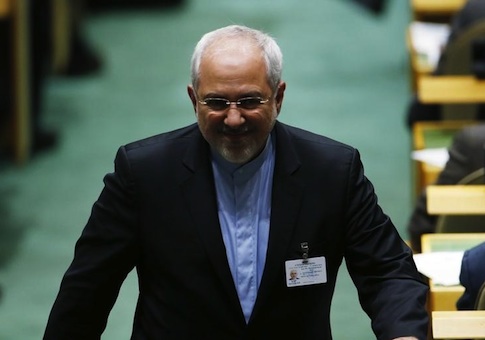By Parisa Hafezi and Fredrik Dahl
VIENNA (Reuters) - Iran does not expect a breakthrough in high-level nuclear talks with the United States and the European Union this week but hopes they will help pave the way for a final deal, its foreign minister said on Tuesday.
Mohammad Javad Zarif, quoted by Iran's Fars news agency, was speaking after arriving in Vienna, where he was due to meet European Union foreign policy chief Catherine Ashton. U.S. Secretary of State John Kerry will join them on Wednesday.
Zarif's cautious optimism came a day after President Hassan Rouhani told Iranian television that a nuclear agreement was "certain" and that only "fine details" remained to be negotiated.
Talks between Iran and six powers - the United States, France, Germany, China, Russia and Britain - are due to conclude by a self-imposed Nov. 24 deadline with, diplomats hope, a deal to end a standoff that has lasted more than a decade.
Ashton, who heads the team negotiating with Iran will "work as hard as she can" to try and get a good agreement by the deadline, her spokesman, Michael Mann, said. "That is extremely important in every way."
With only six weeks to go, Western officials say significant differences remain, especially over the future scope of Iran's uranium enrichment programme, activity that can have both civilian and military uses.
One of Iran's chief negotiators, deputy Foreign Minister Abbas Araqchi, last week raised the possibility that the talks could be extended. But a U.S. State Department official said Washington believed there was still time to reach a comprehensive solution by the target date.
Iran rejects Western allegations that it is seeking nuclear weapons capability. It has refused to halt uranium enrichment, and has been hit with U.S., EU and U.N. Security Council sanctions as a result.
"BREATHING SPACE"
After years of escalating tension, the election last year of Rouhani, seen as a pragmatist, on a platform to ease Tehran's international isolation raised hopes of a diplomatic settlement.
"Although we do not expect a breakthrough in the trilateral negotiations (between Zarif, Ashton and Kerry) ... still this round could pave the way for a final agreement," Fars quoted Zarif as saying. "On the agenda is the volume of uranium enrichment and the timetable for lifting the sanctions."
Israel has threatened to use military force against Iranian atomic sites if diplomacy fails to ensure Iran is deprived of the means of developing nuclear weapons. Tehran says Israel's presumed atomic arsenal is the main threat to peace.
Iran and the six powers last November reached an interim deal under which Tehran suspended its most sensitive nuclear activity in exchange for some easing of the sanctions.
A former Obama administration official said it would make sense to extend the temporary accord if there was no long-term deal by late next month.
"The continuation of an interim agreement would provide the breathing space needed for all sides to take an extended break from negotiations over a permanent deal," Jofi Joseph, a former director for non-proliferation on the White House National Security Council staff, wrote.
(Editing by Robin Pomeroy)
